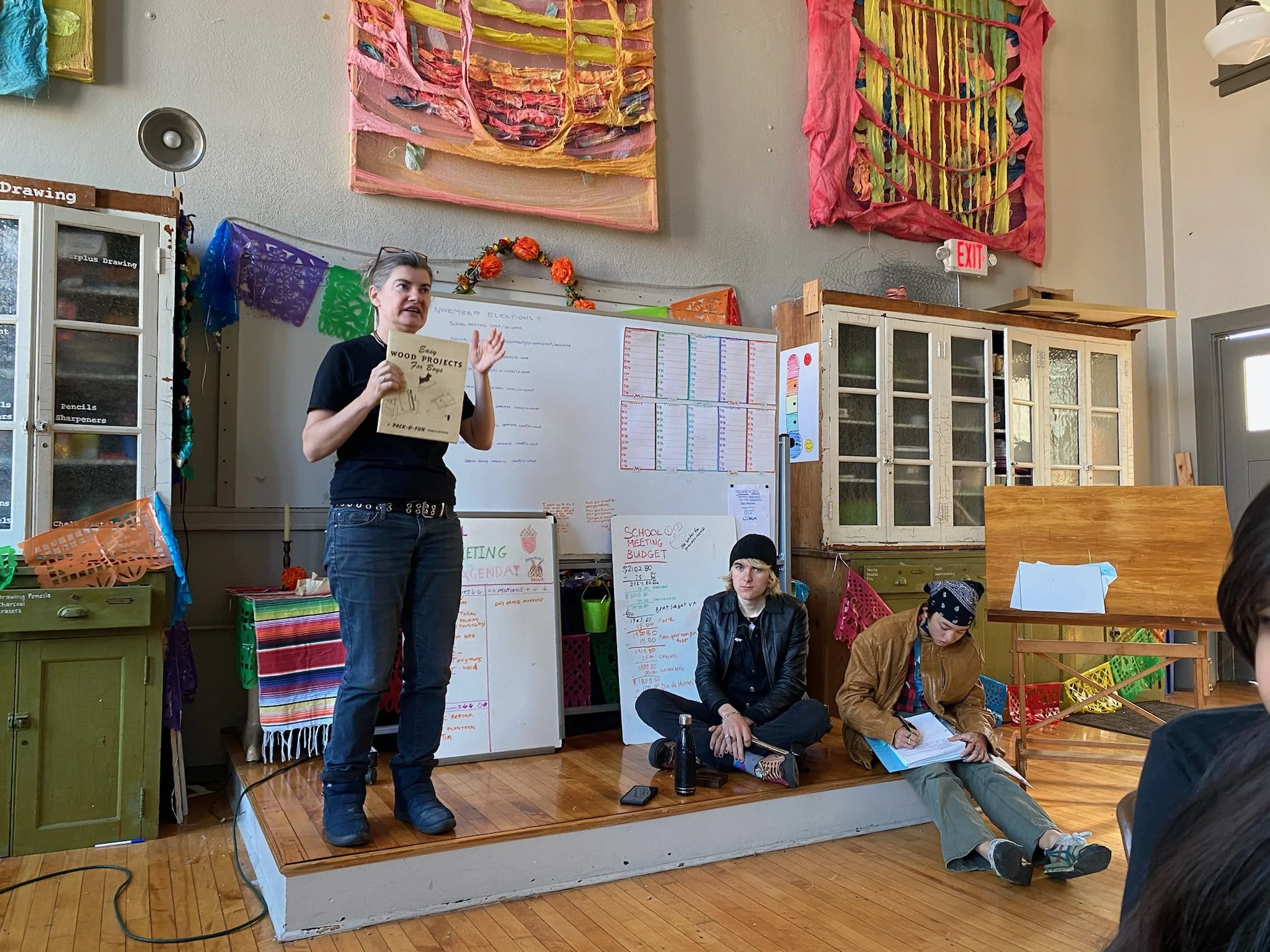Volunteer View
by Phoebe Love
What a volunteer does at Sudbury depends mostly on the volunteer. In my case a lot of it has been playing and inventing/revising games (board or card). Maybe it’s a phase, I don’t know. At the moment, I’m helping Johl invent a game he calls “Naval Warfare, WWI Edition.”
What is it like day to day? As you might know, apart from scheduled meetings, there is no schedule of the sort that mandates people be doing certain things at certain times, except cleaning up at the end of the day. This made me mildly nervous at first. What am I doing? Why am I here? I had read about the Sudbury model in the book “Free to Learn” by Peter Gray, but I knew that I would never really know what it was like unless I was there, and I was right. I’m not the sort of person whose infectious enthusiasm and charisma light up a room, followed by spontaneous conga-line formation, etc., and I sat there feeling useless and doing nothing for a bit. This is why I generally hate parties, unless there’s dancing. But “What am I doing and why am I here?” are questions everyone has to answer, unless they are asleep or doing something they have no choice over. These can be very uncomfortable questions, which is why the greeting, “Staying busy?” is seen as perfectly normal, and why lots of people, especially (and traditionally) men, find retirement depressing. People like to feel useful, myself among them, and also like to feel connected to other people, which has grown harder in our world over the years (See the book: “Lost Connections” by Johann Hari). Because of this, some people (ahem, I) feel quickly unmoored when we have nothing to do, nothing that is specifically expected of us in a given moment. Suddenly we’re the astronaut in the song, whose tether to his ship (and planet and species) has been cut, because the tether is that thin. I even hate vacations sometimes. Point being, this experience has been challenging in a good way, and it very often feels like we’re all in a giant experiment to change our culture, constantly observing, hypothesizing, trying, learning, adjusting, changing, re-observing, comparing notes, again and again. Funtimes!
OK back to Naval Warfare, WWI Edition: One day I was making tiny flags out of toothpicks, for a game involving a spinning cardboard pie dish cover, while playing Code Names Jr. with (among others) Johl. He asked for one of the toothpicks, and later that day he showed me a flag he’d made with said toothpick. I recognized, in the center, the double-headed eagle that I remembered from a brief visit to Vienna (it’s everywhere), even though it was the size of a small pea, and he told me it was the German naval battle flag from WWI. I immediately and predictably chirped, “Let’s make a game!” That was a few days ago, and I’ve learned a lot about U Boats and depth charges since then, as has Johl, although he knew much more about them than I did from the start. What I do in this collaboration is basically ask questions like, “Do boats get to dock at ports of other countries?” and he figures it out.
As I’m writing this, we’re all at Tower Grove Park for a “park day,” which is when we spend the whole day at a park. In front of me a 7 year old is taking apart a large tree branch that probably fell from a recent storm, and behind me people are kicking balls around, reading, or watching the scooter dudes (members of the public, not students) zoom around the empty fountain basin. Last park day, another volunteer brought Four Player Chess, a zany variation which attracted a few rubbernecking passersby, slack-jawed at the slight of black, white, blue, and orange pieces all on an extended board. One of them declared, “I learn something new every day!” Yes yes! Very much our view on education via exposure and doing. Park days happen when someone, usually a student, notices a day of nice weather coming up, and makes a motion at school meeting for that upcoming day to be a park day. I’ve never seen one of these motions fail to carry, although we did cancel one once when the forecast changed. School meeting and the democratic process are the lynchpin of this whole thing. More on that some other time, because that really could be a whole book.



